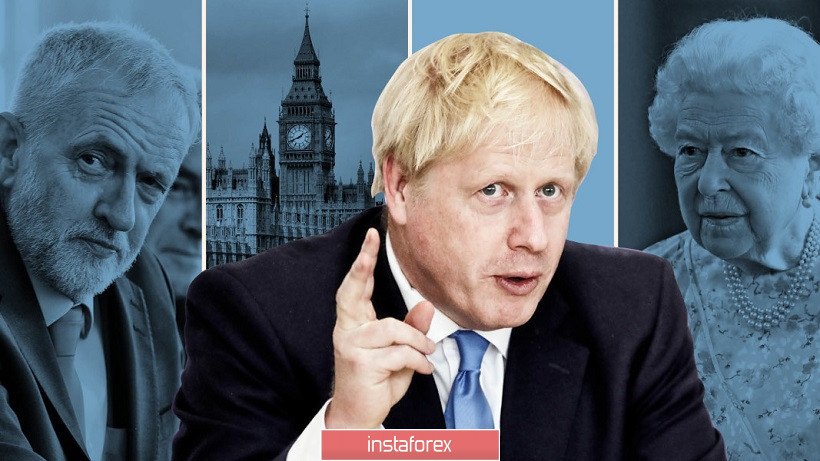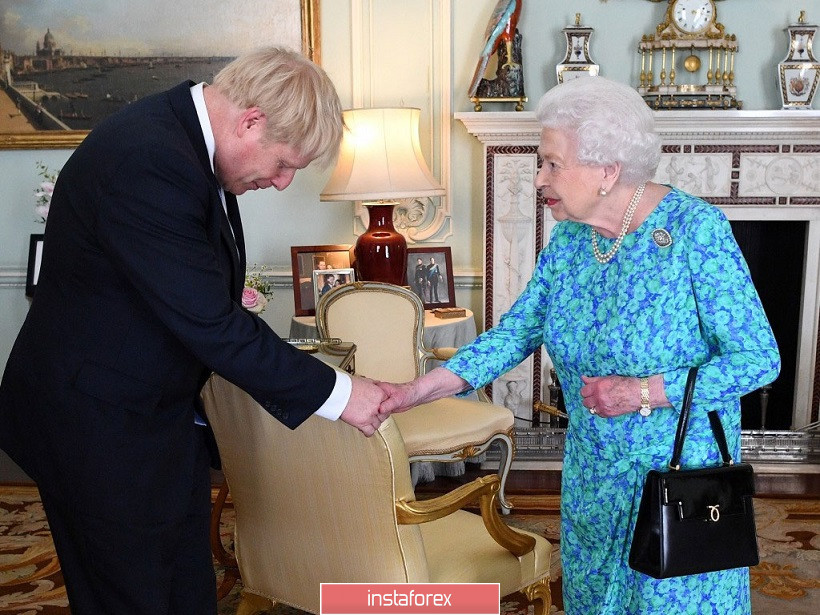The pound-dollar pair plunged to the middle of the 21st figure today, reacting to the latest news around Brexit's prospects. Despite the rather rapid decline, bears of the pair could not overcome the support level of 1.2140, which corresponds to the average line of the Bollinger Bands indicator on the daily chart. Sellers retreated, but did not give up, continuing to put pressure on the British currency.

In my opinion, this price impulse will not continue - at least on today's news. But in general, the closer to the start of the political season in Britain (which will begin next week), the more often such price spikes will occur. After all, by and large, the British currency is preparing for the main political battle of the year, between Prime Minister Boris Johnson and the deputies of the House of Commons. The fate of Brexit is at stake. In the next two months, Britain will either leave the EU without an agreement or extend the negotiation process for an indefinite (or very long) term. Given such a valuable "prize", politicians are thoroughly preparing for the upcoming battle. The unprecedented nature of this process is evidenced by the intentions of the parties to use even the Queen in their plans, which, as a rule, stands apart from such confrontations. But in this case, the government of Johnson and his opponents are ready to resort to the help of Elizabeth II. Today's price impulse, by the way, was also associated with the royal person.
So, the head of the British government today quite officially asked the Queen to suspend the work of the Parliament of the United Kingdom until October 14. The corresponding appeal was published on the website of the British government. Johnson asked Elizabeth II to close the current Parliamentary session in the second week of the September meeting. Here it should be noted that the second session of the current Parliament should begin on Monday, October 14, - on this day the Queen's speech is planned with a detailed description of the legislative agenda. In other words, the prime minister, with the help of Elizabeth II, decided to neutralize the House of Commons, suspending its work for 5 weeks, that is, from September 9 to October 14. According to the plan of the head of government, the deputies in this case will not be able to take appropriate decisions that will actually block the "hard" Brexit.
Naturally, such an unprecedented step on the part of the prime minister caused the effect of an exploding bomb. The pound dipped across the market, responding to Johnson's desperate desire to pull the country out of the EU at all costs. Here it is worth recalling that in July, the GBP/USD pair slumped from the 25th figure to its current positions just after the beginning of active actions by the current prime minister in preparation for the "hard" Brexit. He created the so-called "military cabinet" from among his ministers, launched a large-scale information campaign and urged the Treasury to prepare for the corresponding changes. All this testified to the fact that Downing Street is not bluffing, but seriously preparing to leave the EU without a deal. Today, Johnson once again confirmed the seriousness of his intentions in his letter to the Queen. But in this case, the devaluation of the pound was limited. There are several reasons for this.
Firstly, according to many analysts, Elizabeth II is unlikely to take such a step. According to the British edition of The Sunday Times, the queen has recently expressed dissatisfaction with the way the current political elite rules the country. According to sources, since then, the discontent of Elizabeth II has only grown. Secondly, we must not forget that the House of Commons can also prepare countermeasures. Speaker of the British Parliament, John Bercow, said today that Johnson's decision was a "flagrant violation of the constitution." In turn, the representative of the Parliament from the Conservative Party, Dominic Grieve also commented quite harshly on the prime minister's intentions. He accused his party member of trying to usurp power by attempting to rule the country without a Parliament.

Naturally, the British opposition did not stand aside - Jeremy Corbyn called the prime minister's actions "a threat to democracy." At the same time, both the Labour Party and the majority of Conservatives expressed confidence that the House of Commons would block the government's plans in the near future, and Johnson himself would be declared a vote of no confidence. Representatives of the Cabinet of Ministers retorted that the deputies would not stop the hard Brexit anyway, since they would not be able to form a government of "national unity", which means they would have to go to early Parliamentary elections, the date of which the prime minister appoints. At the same time, they have already announced on Downing Street that in this case, the elections will be scheduled for November 1-5, that is, after the country's actual exit from the EU. In other words, the main intrigue now is whether political opponents in the House of Commons will be able to form an interim government or will Johnson realize his plan?
Thus, the prevailing fundamental background continues to put pressure on the pound. At the same time, short positions in the GBP/USD pair now look risky, since Johnson's recent actions may prompt former political opponents in Parliament to temporarily cooperate to achieve two goals: firstly, blocking the hard Brexit, and secondly, the resignation of Johnson. In this case, the British currency will receive very strong support and it could increase by at least a few figures against the dollar.





















